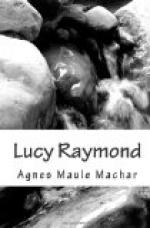During the general engrossment of the household with Stella’s alarming attack, Amy’s rapid sinking of strength was not for some time much noticed, except by Lucy, who felt, in spite of her hopes, that the end was drawing near.
Lucy had been forbidden to speak to her little cousin about death, as if the avoidance of the thought could have anything to do with delaying the event; but happily there was no need for doing so, since her little heart was evidently resting on her Saviour, and she was thus prepared for whatever He should send her. Her childlike faith, and her vivid realization of heavenly things, seemed to grow stronger as her bodily strength failed; and though she never specially referred to death, the approach of which a child is not able to realize, her mind was evidently full of thoughts about heaven, about its glories and occupations, about Him who is “the resurrection and the life.” She was always asking questions about the childhood of Jesus,—questions which Lucy often found it impossible to answer,—and was never tired of hearing the few passages in the New Testament which referred to it.
Some instances of childish sin seemed to weigh upon her conscience; but Lucy reminded her that the Lamb of God had washed away her sins with His own blood, and that the moment we come to Him by faith, we are sure of the forgiveness of past sin, as well as of deliverance from its present power. This perfectly satisfied her, and nothing else seemed to trouble her.
The little girl was intensely interested in the poor Italian, who was sinking almost as fast as she was. He seldom now stirred from his chair in the warmest corner of the room, and his cough had become terribly harassing, especially at night. His breathing, too, was much oppressed; and poor Nelly had often a heavy heart, as the conviction forced itself upon her that she was about to lose the kind friend and protector around whom her warm heart had closely entwined itself. She tried hard to earn a little for his support and her own, by the sewing which she occasionally got, often from people nearly as poor as herself; but her utmost exertions in this way would not have sufficed to keep them from starvation, had it not been for the timely aid brought by Lucy and by Mary Eastwood, whose well-supplied purse was always ready to furnish what was needed for their comfort. Lucy had very little to give of her own, but Mrs. Brooke was sufficiently interested in her account of the case to be very willing to help, for she was not at all indisposed to benevolent actions, if she had had the energy to discover the way. Amy, too, always insisted that a portion of the delicacies prepared for her should be kept for “the poor organ-grinder;” and one of her greatest pleasures was in hearing from Lucy how the invalid liked what had been sent him, and how gratefully he sent his thanks to the little “signorina.” She asked Lucy whether the poor man loved Jesus, and would go to heaven when he died, and seemed much grieved at hearing of his praying to the Virgin, the mother of Jesus.




